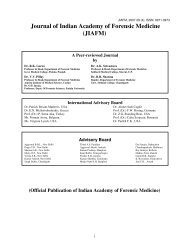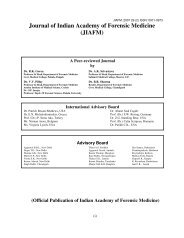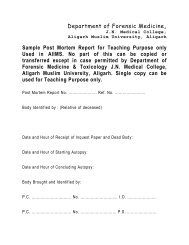jiafm-35-1 - forensic medicine
jiafm-35-1 - forensic medicine
jiafm-35-1 - forensic medicine
Create successful ePaper yourself
Turn your PDF publications into a flip-book with our unique Google optimized e-Paper software.
J Indian Acad Forensic Med. Jan-March 2013, Vol. <strong>35</strong>, No. 1 ISSN 0971-0973<br />
small intestine with their contents, pieces of liver,<br />
spleen and kidneys and sample of blood) were<br />
preserved in saturated solution of common salt<br />
for chemical analysis. To increase the specificity<br />
of results of chemical analysis, additional<br />
samples of gastric lavage were collected from<br />
the casualty and were also sent other than<br />
routine viscera of autopsy.<br />
In present study gastric lavage was<br />
available for chemical analysis only in 186 cases<br />
(64.36%), while in rest 103 cases (<strong>35</strong>.64%) it<br />
was not available due to inclusion of received<br />
dead cases, cases of inhalational poisoning and<br />
corrosive poisoning and the cases which were<br />
brought to us from private hospitals from where<br />
lavage sample was not sent with dead body.<br />
The results were analyzed after<br />
receiving the chemical analyzer reports and the<br />
details of the parameters used in the study were<br />
filled up in Performa and finally conclusions were<br />
drawn after comparing and discussing with<br />
similar type of the work carried out by the foreign<br />
and Indian authors.<br />
Results:<br />
During the period of present study total<br />
1712 autopsies were conducted and out of them<br />
289 cases (16.88%) of death due to poisoning<br />
were studied in detail. In all these cases routine<br />
viscera were preserved for chemical analysis,<br />
and the analysis was done at Forensic Science<br />
Laboratory Surat (Gujarat). In present study<br />
gastric lavage was available for chemical<br />
analysis only in 186 cases (64.36%), while in<br />
rest 103 cases (<strong>35</strong>.64%) it was not available to<br />
send with viscera. In 92.04% cases we received<br />
FSL reports while only in 7.96% cases FSL<br />
reports were not received till the date of this<br />
study. (Table 1)<br />
The analysis of results of FSL reports<br />
shows that when additional sample of gastric<br />
lavage was also sent other than routine viscera<br />
of autopsy the poison was detected by FSL<br />
report in 83.33% cases while it was not detected<br />
only in 9.68% cases and in rest 6.99% cases<br />
FSL reports are not received till the date of this<br />
study. (Table 2) On the other hand when<br />
additional sample of gastric lavage was not sent<br />
with routine viscera, poisoning was confirmed<br />
only in 53.36% cases and not confirmed in<br />
36.9% cases. Analysis of the cases according to<br />
duration of hospital stay shows that as the<br />
duration of hospital stay increases the positivity<br />
of FSL reports were also increasing in cases<br />
where we have sent the additional sample of<br />
gastric lavage with viscera as compared to other<br />
cases where we did not sent it. (Table 3) After<br />
adding lavage sample, the incidences of positive<br />
FSL reports become almost double in cases<br />
where the hospital stay was about 4-7 days and<br />
increased up to almost six times in cases where<br />
the hospital stay was up to more than 7 days.<br />
Discussion:<br />
Diagnosis of death due to poisoning and<br />
detection of specific poison by chemical analysis of<br />
viscera is a routine procedure during the practice<br />
of Forensic Medicine. Vadodara is a city of mid<br />
Gujarat in India and as the chemical factories are<br />
more, it is also known as a ‘chemical city’. Our<br />
institute is a tertiary health center of Gujarat and<br />
we are doing every year around 1800-1900<br />
autopsies in Department of Forensic Medicine.<br />
Failure to detect any poison in the viscera<br />
or other specimen of the individual whose death<br />
was allegedly due to poisoning is not expected<br />
here due to incorrect sampling of fluids and tissues<br />
or their improper preservation, but rather<br />
commonly observed in hospitalized cases where<br />
the patients were treated for few days before the<br />
death. In such cases of false negative viscera<br />
reports, analysis of gastric lavage, blood and<br />
urine samples collected during the treatment<br />
may help us to detect the exact nature of poison<br />
and cause of death.<br />
But similar to other health centers in<br />
India here also the investigations done before<br />
death of the victims are not analyzed with postmortem<br />
investigations, which unable to detect<br />
the exact nature of poison and to confirm the<br />
poisoning as a cause of death in such cases.<br />
On the other hand it also creates an<br />
unwanted legal contradiction in the<br />
circumstances of death as the investigating<br />
agencies believe that results of FSL are reliable<br />
and accurate and performed by a competent<br />
scientific officer, which is an incorrect<br />
presumption, because chemical analysis of<br />
viscera of autopsy has a good specificity and<br />
poor sensitivity as the laboratories use several<br />
methods to screen for toxins and there is no<br />
single, accurate, inexpensive method that<br />
detects all toxins.<br />
There can be other limitations also<br />
because each method differs in cost, accuracy,<br />
complexity, speed and specificity. Problems may<br />
also arise from the changes that occur in the<br />
storage of biological fluids, the transfer of drugs<br />
from tube to tube, and the standards used to test<br />
the particular drugs and poisons. [10] So it is not<br />
wise always to blame the autopsy surgeon for<br />
not able to confirm poisoning as a cause of<br />
death in cases of alleged poisoning.<br />
In present study, to improve the results<br />
of chemical analysis in favor of circumstances of<br />
death we collected ante-mortem samples of<br />
8


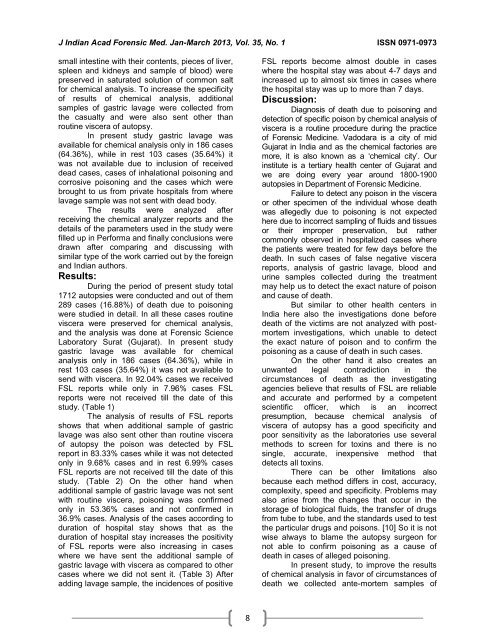
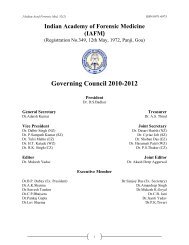
![syllabus in forensic medicine for m.b.b.s. students in india [pdf]](https://img.yumpu.com/48405011/1/190x245/syllabus-in-forensic-medicine-for-mbbs-students-in-india-pdf.jpg?quality=85)
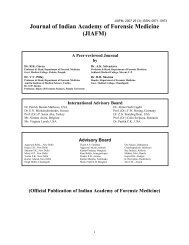
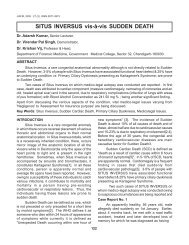
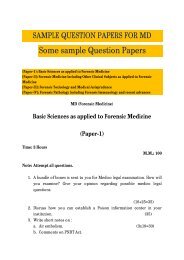
![SPOTTING IN FORENSIC MEDICINE [pdf]](https://img.yumpu.com/45856557/1/190x245/spotting-in-forensic-medicine-pdf.jpg?quality=85)
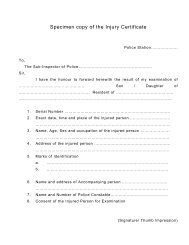
![JAFM-33-2, April-June, 2011 [PDF] - forensic medicine](https://img.yumpu.com/43461356/1/190x245/jafm-33-2-april-june-2011-pdf-forensic-medicine.jpg?quality=85)
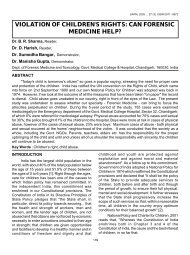
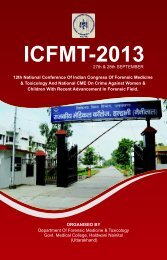
![JIAFM-33-4, October-December, 2011 [PDF] - forensic medicine](https://img.yumpu.com/31013278/1/190x245/jiafm-33-4-october-december-2011-pdf-forensic-medicine.jpg?quality=85)
